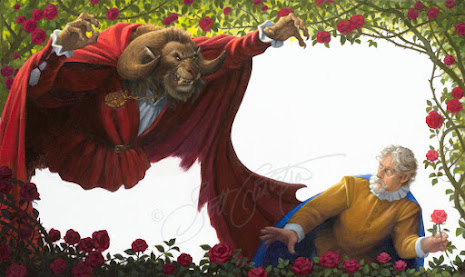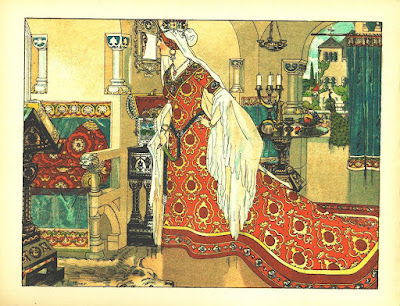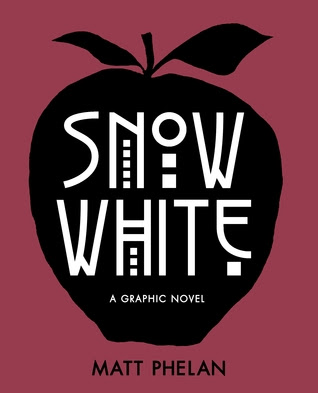Welcome
I have always been a reader. I've had my nose firmly planted in a book since I started reading. One of my very favorite things to read are retellings. What are retellings, you ask?
According to the Oxford Dictionary:
re·tell (verb)
gerund or present participle: retelling
tell (a story) again or differently.
My definition is a little more involved than that. To me a retelling is a sub-genre that takes an existing story and turns it into something new. There are about a million versions of the Beauty and the Beast fairy tale out there, but a retelling would be taking that story frame and setting it in modern day or turning it into a sci-fi space adventure where Beauty is an astronaut and the Beast is an alien.
However, retellings can also be prequels or sequels that are not written by the original author; that take the original story and look at it from a different angle. In our Beauty and the Beast example, perhaps we could get the prequel story of the enchantress. I feel like there's a story there about lost love and physical beauty mattering more than the beauty of the spirit. Something to explain why she got so mad at a young man that refused her entry, that she decided to curse him until someone could love him not for his looks, but for his character. Or perhaps we could look at what happens after the beast is turned back into a prince. Would Beauty still love him? What adventures would their future kids have? What happens to Beauty's greedy sisters?
Historical fiction is kind of a retelling of history, because no one but a contemporary would know exactly what someone would have said, but it's usually a bit too close to the original. I wouldn't call two different story books of Beauty and the Beast a retelling. They may have slight differences, but if the author was trying to retain the original story, then it's an adaptation, not a retelling of the original.
There are some stories/books that skirt the line between history and fantasy. King Arthur was possibly a real guy, but probably didn't pull a magical sword out a stone. In some ways the King Arthur legend could be considered a retelling of the actual King Arthur's life, since it inserts magic into history. The Bible probably has some historical parts to it, but Jonas and the Whale, for example, is definitely a morality tale and not something that actually happened. I'm hoping to tackle some of those at some point as well.
So there you go, that's my definition of a retelling. Taking someone's story and creating something new out of the general framework.
My goal for this blog is to take a fairy tale or novel (usually the classics) or rarely a story from history, outline the general framework of the original story, and then present you with a list of retellings of that story. I also hope to do some reviews of books that fit into the retelling sub-genre as I finish them. So here we go. Welcome, and I hope you find some things you like.
(All images are used with permission from the artist: "Beauty and the Beast" artwork © Scott Gustafson, more information about the artist can be found on his website: www.scottgustafson.com)
re·tell (verb)
gerund or present participle: retelling
tell (a story) again or differently.
My definition is a little more involved than that. To me a retelling is a sub-genre that takes an existing story and turns it into something new. There are about a million versions of the Beauty and the Beast fairy tale out there, but a retelling would be taking that story frame and setting it in modern day or turning it into a sci-fi space adventure where Beauty is an astronaut and the Beast is an alien.
However, retellings can also be prequels or sequels that are not written by the original author; that take the original story and look at it from a different angle. In our Beauty and the Beast example, perhaps we could get the prequel story of the enchantress. I feel like there's a story there about lost love and physical beauty mattering more than the beauty of the spirit. Something to explain why she got so mad at a young man that refused her entry, that she decided to curse him until someone could love him not for his looks, but for his character. Or perhaps we could look at what happens after the beast is turned back into a prince. Would Beauty still love him? What adventures would their future kids have? What happens to Beauty's greedy sisters?
Another form of retelling is taking the original story and showing it from a different character's point of view. A story told from the Beast's point of view, perhaps. Or Beauty's father? The enchantress? There are certainly some great options here.
And I would argue that what most historical fiction authors write are adaptations of history, not retellings of history. Even if they do invent a few characters and dialogue, the general intent is to remain true to the historical context. In order for a historical story to be classified as a retelling, there has to be some new element to it. Perhaps magic, or a "what if" scenario, or the same story set in a different location or time period (for example, Bolu Babalola does this with the story of Nefertiti in her short story collection Love in Color).
My goal for this blog is to take a fairy tale or novel (usually the classics) or rarely a story from history, outline the general framework of the original story, and then present you with a list of retellings of that story. I also hope to do some reviews of books that fit into the retelling sub-genre as I finish them. So here we go. Welcome, and I hope you find some things you like.
(All images are used with permission from the artist: "Beauty and the Beast" artwork © Scott Gustafson, more information about the artist can be found on his website: www.scottgustafson.com)








Comments
Post a Comment